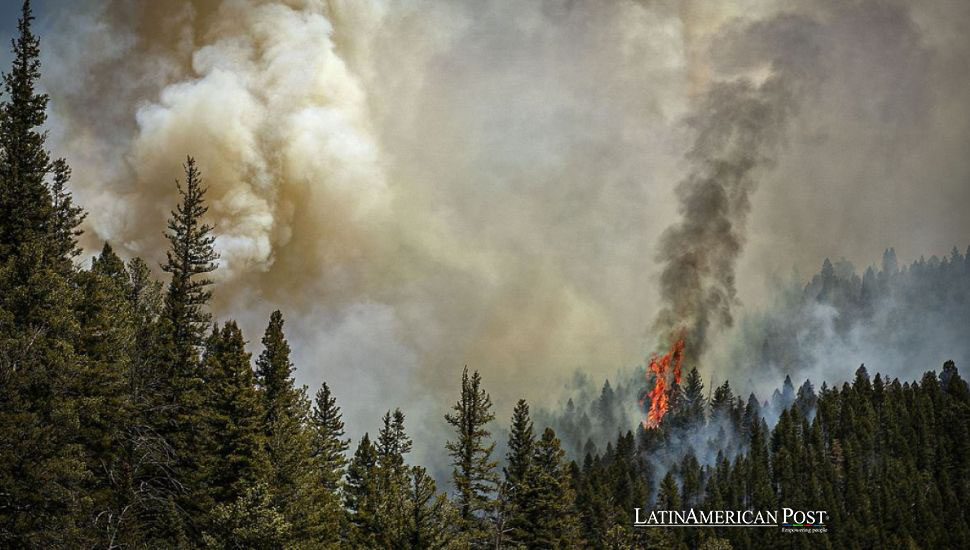Flames Across Latin America: Wildfires Now Ravage Mexico

Devastating wildfires in Mexico, claiming four lives and scorching over 13,000 hectares, underscore a regional crisis as countries like Guatemala and Brazil also grapple with the escalating threat of fires, highlighting the urgent need for cross-border environmental cooperation.
Wildfires Ravage Mexico, Revealing Environmental Challenges
In a stark reminder of nature’s fury, Mexico has been engulfed by a wave of wildfires that has not only claimed lives but laid bare the broader environmental challenges facing Latin America. President Andres Manuel Lopez Obrador confirmed the tragic loss of four lives in Mexico State, which encircles the capital. The fires, part of a larger pattern, have seen 116 active blazes nationwide, contributing to a worrying trend in the region.
With around 400 fires recorded in Mexico up to mid-March, the nation has decimated over 13,000 hectares of land. The fires’ reach, extending to Chiapas at the southern tip near Guatemala, illustrates the transnational nature of this disaster. Fueled by deliberate acts and agricultural activities, these incidents point to a complex web of causes, necessitating a multifaceted response.
This phenomenon is not isolated to Mexico. Countries across Latin America are facing similar threats, with wildfires becoming an increasingly common occurrence. In Guatemala, adjacent to Mexico’s southern border, the situation mirrors the challenges faced by its northern neighbor. Here, fires routinely threaten the lush biodiversity and the livelihoods of local communities, often exacerbated by the same mix of human activities and natural conditions.
The situation in Brazil, particularly in the Amazon and the Pantanal regions, has garnered international attention. The recurring fires in these areas have sparked global concern over the loss of vital ecosystems, driving home the point that the wildfire crisis is a shared problem, necessitating regional collaboration and international support.
The increasing frequency and intensity of wildfires in Latin America are symptomatic of broader environmental and climatic shifts. Deforestation, land-use change, and climate variability contribute to a landscape increasingly prone to fires. Combined with the often insufficient local capacity for fire management and prevention, these elements create a volatile mix that can lead to large-scale environmental disasters.
Towards Comprehensive Solutions
In response to this growing threat, nations across the region are being forced to reconsider their environmental policies and fire management strategies. The need for comprehensive approaches that include forest management, fire prevention education, and enhanced firefighting capabilities is becoming increasingly apparent. Additionally, the importance of cross-border cooperation in managing and mitigating the effects of wildfires has come into sharp focus.
The Mexican government’s struggle against the current wave of fires reflects a more significant regional battle. Addressing this issue offers an opportunity for Latin American countries to unite in their efforts, sharing knowledge, resources, and strategies to combat a common enemy. International partnerships and agreements can also provide the support and infrastructure needed to deal with such widespread environmental challenges.
Beyond the immediate response to the fires, there is a critical need for long-term strategies to reduce the risk and mitigate the impact of such disasters. This includes investing in sustainable land management practices, promoting agricultural methods that reduce fire risks, and enhancing regional cooperation in environmental monitoring and disaster response.
Community Engagement: A Crucial Component
Public awareness and community engagement are also vital components of a successful strategy against wildfires. Educating local populations about fire prevention, encouraging community participation in fire management efforts, and fostering a culture of environmental stewardship can significantly reduce the incidence and impact of fires.
The ongoing wildfire crisis in Mexico and its resonance throughout Latin America serves as a stark reminder of the interconnectedness of environmental issues in the region. It underscores the need for a coordinated, comprehensive approach to disaster management and environmental protection that transcends national boundaries.
Also read: Mexico Uses Human Hair to Battle River Pollution
The wildfires ravaging Mexico and threatening other parts of Latin America are a call to action for the region. They highlight the urgent need for enhanced cooperation within the continent and with international partners to address the root causes and immediate threats posed by these disasters. As Latin America confronts this fiery challenge, the response will shape the region’s environmental future and define its role in the global effort to combat climate change and preserve the planet’s natural heritage.




